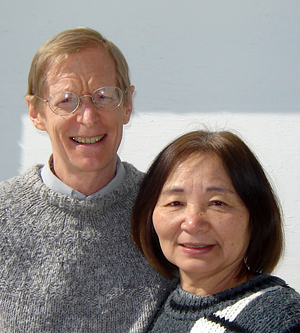Japanese Translation Continues to Progress
Japanese Translation Continues to Progress

By Jeff Wattles, Ohio USA
A translation of The Urantia Book is the product of—would you believe?—teamwork! The chief translator, Hagiko Wattles, is an excellent prose stylist in Japanese whose patient labor has completed the first draft of about 165 of the Papers. Her husband, Jeffrey Wattles, serves as an English language consultant as they work together weekday afternoons in sessions that range from brain cudgelling to laughter and satisfaction. Robert Reno has contributed technical assistance and a greatly improved computer. His wife, Mezuru Kawahara, happens to be Microsoft's person in charge of developing software for users who write in Japanese. The two of them recently contributed state-of-the-art software. Rob is a world-class expert on Shin Buddhism with many contacts that will be particularly valuable in years to come. These words echo in our ears as we look for a revival of that tradition.
The great strength of Buddhism is that its adherents are free to choose truth from all religions; such freedom of choice has seldom characterized a faith on our world. In this respect the Shin sect of Japan has become one of the most progressive religious groups in the world. It has revived the ancient missionary spirit of Gautama's followers and has begun to send teachers to other peoples. This willingness to appropriate truth from any and all sources is indeed a commendable tendency to appear among religious believers during the first half of the twentieth century after Christ. (1041)
Edward Southwick is another member of the team. He shuttles between the United States and Japan, and his Japanese wife has begun studying the Papers seriously. Hagiko and Jeff also note Richard Keeler's friendly leadership and the welcome words of encouragement from Seppo Kanerva, whose trustworthy hand gives confidence that this project is indeed being shepherded by a mature and well-led organization. Also worth mentioning is the translators' discussion list, which enables us to share questions with other translators and to experience fellowship with persons who have had the experience of bringing such a project to fruition.
Hagiko is grateful for support that enables spiritual help to be made available to her beloved country. Japanese immigrants in North America and elsewhere generally do not read English well enough for the demands of the English edition of The Urantia Book. There is a certain interest in the book in New Age circles. And then there will be Christians, a minority whose influence in Japanese society extends far beyond their numbers. It is a privilege to participate as we are able.
